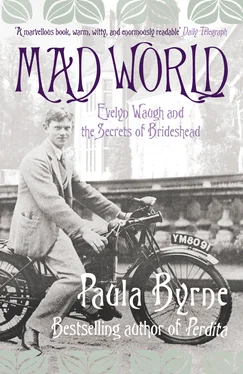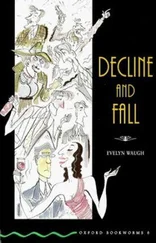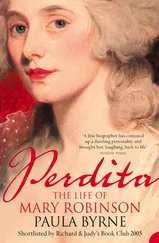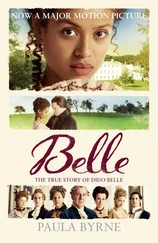Evelyn hero-worshipped Acton. He would eventually dedicate his first novel to him ‘in homage and affection’. They were an unlikely pair. Even Evelyn was puzzled as to what they had in common. Acton was worldly, sophisticated, cosmopolitan. Evelyn was self-confessedly ‘insular’: ‘At the age of nineteen I had never crossed the sea and knew no modern language.’ What drew them together, he said, was what he called gusto , a ‘zest for the variety and absurdity of life, a veneration of artists, a loathing of the bogus’. Acton was the leader and Evelyn the follower. Evelyn loved the slightly older man’s funniness, his cleverness, his eccentricity. ‘He loved to shock and then to conciliate with exaggerated politeness … he was himself shocked and censorious at any breach of his elaborate and idiosyncratic code of propriety.’
Harold Acton was equally enchanted. He described Evelyn as ‘an inseparable boon companion … I still see him as a prancing faun … wide apart eyes, always ready to be startled under raised eyebrows, the curved sensual lips, the hyacinthine locks of hair’. He detected something behind the shyness: ‘So demure and yet so wild.’ He loved the mischievous sparkle in his friend’s eyes, the capacity for joy, the jokes. Evelyn’s wit, charm and gift for irony compensated for the mood swings that Acton also observed: ‘Spontaneous, ebullient, vivacious, then silent, sullen, staring at the world with critical distaste … his apparent frivolity was the beginning of true wisdom.’ For Evelyn ‘a sense of the ludicrous’ was the essence of sanity.
Though intoxicated by Acton and the new set into which he was drawn, Evelyn was wary of Brian Howard, describing him as Lord Byron was famously described a century before: mad, bad and dangerous to know. Howard’s ‘ferocity of elegance’ seemed to belong to the age of Byron, not the present. Evelyn couldn’t quite cope with it. Or perhaps it was the sheer exhibitionism of Howard’s homosexuality that both fascinated and repelled him.
Harold Acton gave Evelyn an entry into the Hypocrites’ Club. There he discovered hard drinking and firm friendship: ‘it was the stamping ground of half my Oxford life and the source of friendships still warm today’. It was at the Hypocrites that he was introduced to Hugh Lygon and his elder brother Elmley.
The Hypocrites was one of many drinking clubs at the university – such clubs were necessary because undergraduates were banned from going into the city’s pubs, for fear of town versus gown fisticuffs or liaisons with unsuitable women. The most exclusive of the clubs was the famous Bullingdon, immortalised by Evelyn in his novel Decline and Fall , where it becomes the Bollinger Club, characterised by ‘the sound of the English county families baying for broken glass’. The Bullingdon was a top-secret (all male, of course) dining club, not strictly a drinking society. Then, as now, it drew its membership from the super rich. It was known then for champagne drinking, ritualised violence and a uniform that consisted of exquisite Oxford blue tailcoats offset with ivory silk lapel revers, brass monogrammed buttons, mustard waistcoat and sky blue bow tie. All members had to endure a humiliating initiation rite that included having their rooms trashed as champagne was binged upon and regurgitated. Freddy Smith, second Earl of Birkenhead (president of Pop at Eton, Christ Church man and future military colleague of Evelyn in Yugoslavia), captured the Bullingdon men with aplomb: ‘eldest sons from aristocratic families who drank champagne at breakfast and were often to be found flourishing hunting-whips and breaking windows in Peckwater Quad’.
Harold Acton was not the type (or the class) to have become a member of the Bullingdon. Brian Howard, on the other hand, being a huntsman as well as an aesthete, was once invited to one of their dinners, after which 256 panes of college glass were smashed. He followed up this adventure by spending, as he put it, ‘a tumultuous night between the sheets’ with a club member.
The Hypocrites’ Club did not have quite the same exclusivity, though it too was characterised by a love of fine dining and, most importantly, hard drinking. If the motto of the Bullingdon was an unequivocal ‘I love the sound of broken glass’, that of the Hypocrites was laced with neat irony: ‘water is best’. The watchwords were style and panache. Conversation turned on art and literature rather than deer-stalking and riding to hounds. The club was at this time in a state of transition. Its original members had been heavy drinking but somewhat sombre Rugbeians and Wykehamists (former pupils of Rugby and Winchester, the latter being generally regarded as the most academic of the great public schools). But as Evelyn arrived in Oxford it was in the process of ‘invasion and occupation by a group of wanton Etonians who brought it to speedy dissolution’. The Hypocrites’ Club was beginning to be associated with flamboyant dress and a manner that had the distinct smack of homosexuality. The name of the club came from the ancient Greek word for an actor: it was a place where you could pose and play roles. The president was Lord Elmley. As the sons of an earl, Elmley and Hugh were natural Bullingdon men. Their presence among the Hypocrites was intriguing and provocative.
‘At Oxford I was reborn into full youth,’ wrote Waugh apropos of his life once he had been initiated among the Hypocrites. He later denied that he had any ambitions to ingratiate himself with the wealthy or to ‘make influential friends who would prosper any future career’. He said that his interests were ‘as narrow as the ancient walls’. For Evelyn it was quite simple: he wanted to be loved and he wanted to live fully and freely – ‘I wanted to taste everything Oxford could offer and consume as much as I could hold.’
Gone were the days of bread, cheese and beer in the Hertford Underworld. Now it was abundant food and fine wines, claret followed by port. He quickly ran into debt and had to auction all his books.
In his capacity as club president, Elmley promulgated a rule that ‘Gentlemen may prance but not dance.’ Along with aestheticism and irony, a welcoming of overtly homosexual behaviour was one of the things that set the Hypocrites apart from the Bullingdon, let alone the rowing and rugger clubs.
The Hypocrites initiated Evelyn into the habit of hard drinking. Because of fear that American-style prohibition might be on the way to Britain, there was ‘an element of a Resistance group about the drunkards of the period’. The club premises – rooms above a bicycle shop – were described by one of Evelyn’s friends as a ‘noisy alcohol-soaked rat-warren by the river’. Evelyn remembered a Tudor half-timbered building with a steep and narrow staircase, smelling of onions and stewed meat. He said that the local police constable was usually to be found there, taking a break from his beat, standing in the kitchen, mug of beer in one hand and helmet in the other. The two large rooms beyond the kitchen were decorated with murals by Oliver Messel and Robert Byron. There was a large piano where members played jazz riffs or accompanied the singing of Victorian drawing-room ballads.
Though Evelyn portrayed the place as a den of iniquity, it was actually very civilised. Harold Acton said that there was always someone to talk to ‘with a congenial hobby or mania’, as if suggesting a tweedy discussion of stamp-collecting rather than a Bullingdon-style debauch. What Evelyn loved about the place was its conversation . He relished hearing Acton affect an Italian accent and say: ‘My dears, I want to go into the fields and slap raw meat with lilies.’
In his memoirs Evelyn gave a roll call of the names of famous people who were members of the club. The best and worst that the university had to offer were either members or guests. The club was beginning to get a reputation. Isis , the university newspaper, reported that its members were distinctly alarming on account of their dazzling intellectual catch-phrases and cultivated rudeness.
Читать дальше












